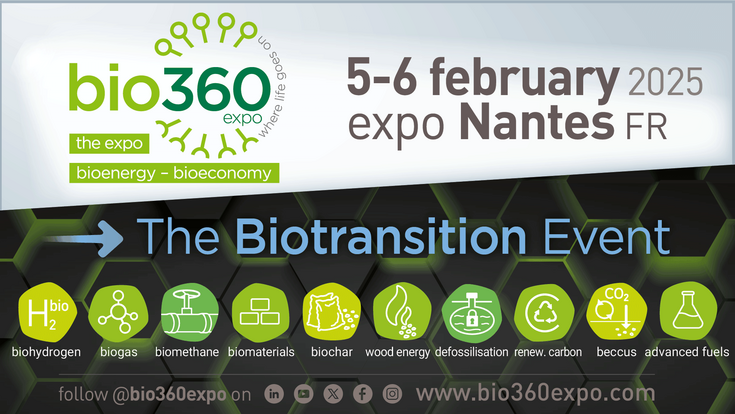Event : Bio360 2025 – In a Nutshell

We all recognize the urgency of the task to address and reverse rising temperatures and ensure energy security through massive upscaling of renewables. Solutions to decarbonise energy generation, transport, industry etc. such as biomass and wood-energy, waste recovery, biogas, biomethane, green hydrogen, liquid biofuels, co-product valorisation, biobased products must all be at the forefront of our response to tackling climate change and are equally at the forefront of what can be found at Bio360.
What to expect from Bio360 2025 ?
Building on its international outlook and scope, central to Bio360’s mission is to scan the horizon far and wide to identify and bring together leading international practitioners, entrepreneurs, scientists, decision makers, public bodies etc who are embracing and committed to the biotransition.
Bio360 in a nutshell comprises a two day-exhibition dedicated to bioenergy and the bioeconomy, 400+ international exhibitors and 5000 professional participants, a rich programme of international conferences across 7 conference rooms, study tours the innovation competition … all key components of this stand-out event.
Take a closer look at Bio360
The event dedicated to accelerating the biotransition, by revisiting www.bio360expo.com.
As an event, Bio360 continues to cement its position as the international meeting hub for those engaged in making the Biotransition a reality and pushes beyond the “single discipline” approach to actively exploring and highlighting the opportunities for sectoral cross-over between bioenergy in its solid, liquid and gaseous forms, CCU and CCS, biochar and the inter-related possibilities of biobased materials. Inherent to this outlook is the achievement of a truly circular economy whereby previously termed “waste” or by-products from one process cascade on to becoming a valuable resource for another. Many examples of this are in evidence on the stands or in the conferences: CO₂ from biogas upgrading for injection into recycled concrete or for microalgae growth, “waste” effluents for hydrothermal gasification (providing biomethane and also valuable phosphorous for agriculture) or for biohydrogen production or biochar production, biomass for displacing fossil fuels for industry, non-recyclable wastes for gasification and production of advanced liquid fuels, to name but a few.
Relive the 2024 edition - he conferences, the exhibitors, the photo pack and more …
